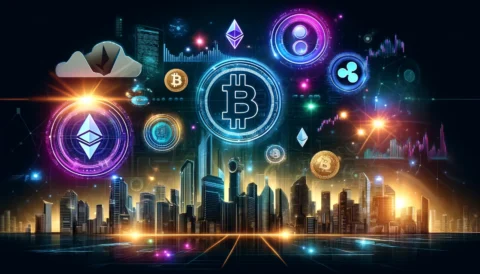Contents
Since their inception in 2017, when American studio Larva Labs produced the iconic Cryptopunks digital portraits, non-fungible tokens (NFTs) have advanced significantly. NFTs are currently upending the art and collectibles industries, from “Side Eyeing Chloe” and Jack Dorsey’s first tweet to NBA Top Shots trading cards and the $69 million Christie’s sale of digital artist Beeple’s “Everyday’s – The First 5000 Days.”
However, the promise of NFTs goes far beyond digital art, and some of the most ground-breaking and disruptive blockchain applications are made possible by their non-fungibility.
What is NFT?
A unique digital or physical thing must have ownership of an NFT, which is a digital token. Digital art, virtual trade cards, and in-game assets are now the most popular commodities sold as NFTs, but it is also possible to “tokenize” tangible items like real estate or even luxury watches.
A smart contract that is stored on blockchain power every NFT that is created. This smart contract maintains the transferability of the NFT, gives information on its special qualities, and can establish rules for its use. It also assigns and tracks ownership of the underlying object.
What is Fungibility?
NFTs are not fungible, hence the moniker “non-fungible tokens,” which is the main distinction between them and other cryptographic tokens. The characteristic of fungibility determines whether or not one thing can be substituted for another of its sort without losing value.
Blockchain now introduces non-fungibility to the digital universe in the form of NFTs, just as it introduced fungibility to the digital space and allowed us to exchange value like-for-like in the form of cryptocurrencies.
The immutability, dependability, transparency, and decentralization of blockchains open up new possibilities for the frictionless exchange, trading, and sharing of digital representations of any form of assets, and this is expected to inspire new blockchain-based innovation for many organizations.
Blockchain & NFTs
Similar to how blockchain introduced fungibility to the digital world and allowed for like-for-like value exchange in the form of cryptocurrencies, blockchain now introduces non-fungibility to the digital world in the form of NFTs.
The immutability, dependability, transparency, and decentralization of blockchains open up new possibilities for the easy exchange, sharing, and trading of digital representations of any form of assets, and for many enterprises, this is likely to spark new blockchain-based innovation.
Although NFTs can be implemented on almost any blockchain that allows for smart contract programming, the ERC-721 standard on the Ethereum blockchain is the most widely used industry standard. This is one of the things to keep in mind when debating on Flow vs Ethereum blockchain for your business.
ERC-721 enables the opportunity to include comprehensive metadata about an item, such as previous ownership, in contrast to specifications for fungible tokens. Additionally, it enables each token to have unique characteristics that set it apart from other tokens; these characteristics are listed in an off-chain file that can be accessed via the token’s metadata.
NFTs in Supply Chain
The supply chain industry has become aware of the system’s fragility in the last two years, as well as how an operating failure in one nation might negatively affect the chain as a whole. Therefore, non-fungible tokens have attracted a lot of interest in order to address this worldwide disruption in the upcoming years.
NFTs in supply chains are a relatively new idea, and few people are aware of the advantages of supply chain streamlining. The industry is aware of the potential of blockchain as a problem-solver, but NFTs are irreplaceable tokens with more profound uses.
NFTs provide the sole source of reality. One single fact from the seller’s seller to the buyer’s buyer sets off the cycle of creating superior supply chain cooperation. To establish SCC (Supply Chain Collaboration) and enable businesses to benefit from collaboration by sharing resources and data, trust is required.
Businesses can eliminate supplier-boarding inconsistencies by implementing NFT. Data cannot be changed since NFT is a non-changeable asset. For all the enablers, NFT aids in the creation of a shared procurement platform.
Due to NFT’s use of blockchain technology, it is possible to locate suppliers who pose the least amount of risk, provide a single platform for comparisons, forecast and manage risks, and align supplier standards with industry standards.
Every component of a system that uses NFTs is given a unique digital identity. For instance, in the car industry, each semiconductor will have its own digital identity saved in the system. Additionally, it will geolocate itself and time-stamp data to update it automatically.
Anti-Counterfeit Solution in Supply Chain
One of the crucial aspects of the blockchain supply chain is finding an adequate anti-counterfeit solution. Despite the non-fungibility of the tokens, fraudsters might be able to duplicate them. These con artists can memorize the entire ecosystem of the automotive supply chain.
An anti-counterfeit solution, such as Blockverify, is a powerful business blockchain protocol ensuring secure data storage for information about the product’s origin and producer. It enables product tracking and supervision from assembly lines to warehouses to retail locations and end-users.
The drawn-out and expensive process presents another difficulty. Not every company in the supply chain system is aware of and able to use NFTs. To implement the NFT program, all supply chain partners need to conduct in-depth research and grasp it well.
In Final Words
Companies may demonstrate their transparency to customers anywhere in the world with NFTs. Implementing NFT has a little advantage over rivals in the areas of blockchain, IoT, and digitization. Digitally representing unique assets is moving toward more involved, paper-trail-requiring procedures.
NFTs will serve as the source of uniform information for all the stakeholders along the chain, from manufacturing facilities to retailers and from the port of the exporter to the port of the import. Better value chains can be established from the beginning for organizations, and NFTs may be the change agent for intricate supply chains.
This is why finding a blockchain consultant you trust is often more important that the implementation of the solution. With years of experience, they can advise you on the best options and create a customized product for your business.



